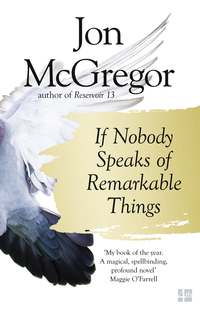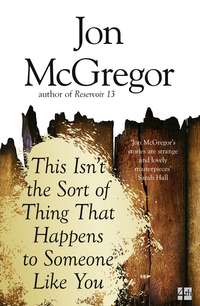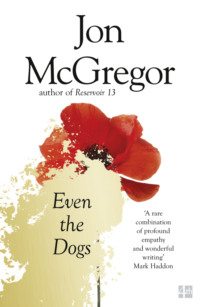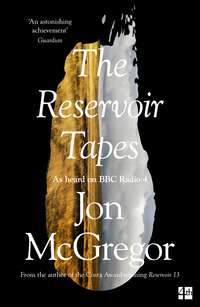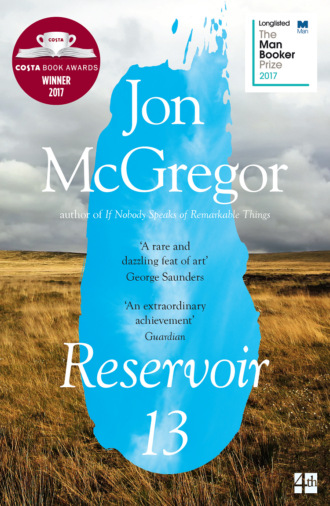
Полная версия
Reservoir 13: WINNER OF THE 2017 COSTA NOVEL AWARD
The girl’s parents were seen near the visitor centre, walking up the hill with a pair of detectives. From a distance their movements looked stiff and slow. They took a wide detour around the area where she’d last been seen. The flags had been taken down and there was nothing to mark the spot. No one would know it, unless they knew. They followed the old bridleway which led past Black Bull Rocks towards the reservoirs. They were gone for most of the afternoon, and by the time they came back there were photographers waiting in the car park. It had been more than six months and still there was nothing. No footprints, no clothing, no persons of interest, no sightings on any CCTV. It was as though the ground had just opened up and swallowed her whole. Journalists used this phrase by way of metaphor or hyperbole; people in the village knew it as a thing that could happen. Questions were asked about how much longer the parents would stay. The Hunters had cancelled all the bookings in the barn conversions, but it wasn’t known how long that could go on. Little was seen of them, and if the Hunters knew anything they weren’t passing it on. It was known that Reverend Hughes was visiting. More flowers and candles were left at the visitor centre, and the question of what to do with them was broached. It was understood that the girl’s father had been seen out, walking. It wasn’t known what he was trying to achieve. Irene said he was taking it badly, and was asked what the hell other way she’d imagined him taking it. Woods was found working security on a building site in Manchester. He was arrested and questioned at length. There was nothing to link him to the missing girl, and he had an alibi for the night in question. It hadn’t been his van that was seen, as it turned out. He was released, and immediately rearrested on a number of other charges relating to theft and handling. In the hay meadow south of the church there were groups of wild pheasants moving through the grass, the mothers steering their young with nips and cries, whole groups scattering at the slightest noise. Cathy Harris walked around the edge of the meadow and crossed the river with Mr Wilson’s dog. As she entered the woods she let the dog off the lead and squeezed between the gapstone stile. People wanted the girl to come back, so she could tell them where she’d been. There were too many ways she could have disappeared, and they were thought about, often. She could have run down from the hill and a man could have stopped to offer her a lift, and taken her away, and buried her body in a dense thicket of trees beside a motorway junction a hundred miles to the north where she would still be lying now in the cold wet ground. There were dreams about her walking home. Walking beside the motorway, walking across the moor, walking up out of one of the reservoirs, rising from the dark grey water with her hair streaming and her clothes draped with long green weeds.
The last days of August were heavy with heat and anything that had to move moved slow. At the allotments the beds were bursting with beans and courgettes, the plants sprawling over the pathways. The bees stumbled fatly between the flowers and the slugs gorged. The first lambs were ready to sell and Jackson’s boys were busy making selections and loading them into the trailer. At the cricket ground the annual game against Cardwell was lost. The girl’s mother came to the church from time to time. She arrived just before the service began, escorted by the vicar to a seat in the side aisle which was kept free for her, and left during the closing hymn. There was an arrangement. Jess Hunter sometimes waited for her in the car outside. People understood they were to leave her be. When it came to sharing the peace she shook hands briefly, with a smile that some said seemed defensive and others took as grateful. Late in the summer the teenagers held their own search party. It was James’s idea. They could walk up over the moors, go as far as Reservoir no. 13, check all the places they knew about that the police wouldn’t have thought of. If they found anything they’d be on the news. Liam said they could take some cans, make it a party. A search party. Lynsey said it was messed up making a joke about it. They headed out early, Liam and James and Deepak, Sophie and Lynsey, each telling their parents something different, meeting at the car park by the allotments and cutting up through the beech wood while the morning air was still cool. They had ideas about what had happened to Becky, based on what they knew about her, and what they thought themselves capable of in the same situation, and on what they knew of the landscape. They’d seen her the previous summer, when the family had stayed at the Hunter place for a fortnight, and they’d spent more time with her than people seemed to know. It made them feel involved. By midday their pace had faltered in the heat and they stopped at a fork in the tracks. At the bottom of the hill there was a ruined barn where Jackson stored feed and equipment. They were thirsty and they shared the only two cans of lager they’d managed to get hold of. There were crickets in the heather and a beetle moving on Lynsey’s hand. The sheep pushed in and out of the barn, looking for shade. Did they search that place? Deepak asked. Obviously, Liam said. I searched it myself. I borrowed one of those thermal-imaging cameras; nothing. Deepak gave him the standard slap for bullshitting. They searched everywhere, said James; so what are we doing? No one answered. Lynsey and Sophie had their eyes closed already, and in the midday sun Sophie’s skin was starting to burn. There were butterflies feeding on the heather. An aeroplane went overhead. What time is it? asked Liam. About twelve, James said, his eyes closed, guessing. The heather sprang firmly beneath him. They were all lying closer to each other than they were used to. Someone’s stomach gurgled and no one acknowledged. There was a distant sound of traffic, and farm machinery. They slept. At some point James saw a man walking up the path towards them, poking at the heather with a stick, and as he came past he didn’t seem to see the five of them lying there. He was wearing a charcoal-grey anorak. James stood up and the two of them nodded, and James meant to say he was sorry about the man’s daughter but all that came out was sorry. The man nodded again and kept walking. Later James wondered if this had happened at all. It would have been too hot to wear an anorak. In the afternoon the five of them made it to the top of the hill overlooking Reservoir no. 8, and it turned out that Liam had brought vodka. They found a mine entrance they hadn’t seen before and went in with torches, scratching a line in the mud behind them and putting the wind up each other. When she was very scared Lynsey grabbed on to Deepak’s arm. By the time they came out again it was dark, and in their confusion they went down the wrong side of the hill. When they finally got home they were in more trouble than they thought possible. Their parents were furious and held them close, and there were police officers waiting to have words.
Su Cooper redecorated the small bedroom in their flat above the converted stables, ready for the twins. Austin had offered to help, but she’d told him he had too much on with the Echo and she wanted to just get it done. He’d asked if there was something she meant by this. She hung animal-print curtains at the windows, and assembled the second cot more easily than the first, and fixed hooks in the ceiling to hang mobiles from. She folded the tiny white clothes into the drawers, and stacked nappies on top of the wardrobe, and arranged toys along a shelf. It was a small room, but everything the babies would need seemed to fit. It was a small flat. The space had once been sleeping quarters for the stable lads. It had never been meant for a family to live in. But Su and Austin had loved it since they’d first moved in, and they were determined to make it work. She’d bought storage baskets which slid neatly beneath both cots. She knew there was a danger in preparing the room so thoroughly, so soon. There were people who had superstitions about this kind of thing. She knew her mother wouldn’t approve. But she wanted it done. She wanted to be ready. She didn’t yet know people well enough to assume they would help. She didn’t know how Austin would rise to the challenge. She suspected he might not. She suspected he was the kind of man who would gaze lovingly at his infant without realising it needed a nappy change, or another feed. He would provide for them, she knew. She had waited until she was sure of that. But he would have no idea what to do. This she was prepared for. He was a sentimental man, and, when it came to anything besides the business of writing and editing and printing, completely unpractical. She wound the babies’ mobiles, and listened to the whirring tunes, watching the snails and frogs turning circles in the sunlight. She’d closed the door behind her before the music had stopped. The badgers in the beech wood fed quickly, laying down fat for the winter ahead. They moved through the leaf litter in a snuffling, bumping pack, turning up earthworms and fallen berries. Their coats were thickening. The river turned over beneath the packhorse bridge and ran on towards the millpond weir.
The clocks went back and the nights overtook the short days. The teenagers walked home from the bus stop in the dark. A man fitting the missing girl’s father’s description was seen walking further and further away from the village; at the far side of Ashbrook Forest, past the last of the thirteen reservoirs. There were reports of a man in a charcoal-grey anorak walking on the hard shoulder of the motorway. The bracken was rusting in swathes across the hill. There were dreams about the missing girl being found face-down in pools of water, and dreams about her being driven safely away. Mischief Night passed and it wasn’t what it had been in recent years. No one quite had the spirit, besides whoever filled the telephone box with balloons. Jackson’s boys brought the flock down to the bye field and spent the day clipping around the tails, getting ready for tupping. At the school the lights were seen on early, and there was black smoke rising from the boilerhouse. In the staffroom Miss Carter was running through the week’s lesson plans with Mrs Simpson. When they were done Mrs Simpson asked Miss Carter how she was settling in. Miss Carter nodded quickly and said it was fine, it was only that she was finding it hard to get to know people. Mrs Simpson laughed and said she knew what Miss Carter meant, and had she tried marking up the register with little portraits to jog her memory? Miss Carter said she hadn’t meant the children. I thought you meant settling into the area, she said. Mrs Simpson apologised and said that to avoid confusion Miss Carter should know she’d never ask anything about a teacher’s private life. We’re only worried about what happens within these gates, she said. At the reservoirs the dams were inspected again, and areas of concern were noted. In the dusk the woodpigeons gathered to roost.
In November Austin Cooper and his wife came home with twins, and carried them up the steps to their flat above the converted stables. When he turned to close the door he stood on the threshold for a moment, looking down at the street, as if expecting or perhaps even hearing applause. It would have been deserved, was his feeling. He’d never imagined finding the kind of deep friendship he’d found with Su, and ten years later the twins’ arrival was the kind of extra he’d long trained himself not to expect. At some point, in some life, he must have done something right. Irene saw him closing the door, saw the deep glowing light from their windows, and remembered bringing her own Andrew home some fourteen years before. But when she got to the Gladstone and told people there, all anyone could say was sweet buggering hell, those steps; how’s she going to get a twin buggy up and down those steps? Austin didn’t sleep that first night. He made hot drinks for Su while she phoned her parents and friends and told them the news all over again, and later he walked in and out of the bedroom to look at the rest of his family sleeping, and finally he lay down beside Su and listened to the different sounds of breathing in the room: Su’s long and measured; the twins’ fast and shallow, as though they’d only just come up for air. In the night there was crying and waking and feeding and changing, but amongst it all there were moments when the breathing was the only sound in the room and Austin felt he had only to stay awake to keep them safe. That this was the only thing required of him now. In the evening when Su had been on the phone to her parents he’d tried to pick out some of what she said. He knew the words for mother and father and children, but beyond that he was lost. He thought he knew the word for happy, but Su spoke so quickly to her parents that he could never be quite sure. He assumed she was happy. Mostly she just seemed tired. It was so long they’d been hoping for this; she’d been trying so hard and now all the strain in her body had nowhere useful to go. It looked a comfortable sort of tiredness, a relief. He could tell already, from the way she held the twins and the way she moved around them, or leant across and made small adjustments while he was holding them, that she knew exactly what she needed to do. And that she knew without even being surprised. It was one of the things that kept delighting him about Su, this equanimity. As though she’d known all along that life would be like this. The very first night they’d spent together, the look on her face in the morning had seemed to say well, now, of course this has happened. What else did you expect? Early in the morning the lights were seen on downstairs, where Austin had converted the stables to an office for the Valley Echo. The white office lighting was stark against the dawn and the dome of his head was just visible through the window as he worked on the last few pages of the next issue, adding something to the announcements column while being careful not to exploit his position. And when the issue appeared through letterboxes and on shop counters a week later there was only this for the few who didn’t already know: Su Lin Cooper and Austin Cooper announce the safe arrival of their twin sons, Han Lee Lin and Lu Sam Lin, and thank everyone for their kind wishes.
At the school the lights were seen on early in the hall. Preparations were being made for the Christmas assembly. Jones had cut holly and fir from the woods, and Mrs Simpson was on her knees arranging it around the nativity scene. Miss Carter asked Jones to hold the bottom of the ladder while she took some tinsel up. Ms French couldn’t help noticing, glancing across from her half-finished wall display of shepherds and cotton-wool sheep, that Miss Carter was wearing a skirt. Also that Jones was not keeping his eyes down. She didn’t like to interfere but she thought it best to ask Jones to put the chairs out instead. When Miss Carter looked down to see no one holding the ladder she stood very still, and looked at the wall in front of her, and tried not to think about how recently Jones had polished the floor. She found herself thinking about Tom Jackson’s father, Will, and about him not seeming the type to wander away from a ladder like that. She held on tight. There were carols in the church with candles and the smell of cut yew and holly. Olivia Hunter sang a solo verse of ‘Silent Night’. She was eight years old and blithely confident. Her voice trembled a little on all is calm, all is bright, and at the end of the verse she beamed as she waited for the congregation to join in. At the village hall the production of Jack and the Beanstalk was finally staged. The costumes and scenery had all been kept from the year before, and most people had been happy to keep the same parts. The hall was full on the night of the show. Lynsey Smith had shot up over the year, and was looking less boyish than when she’d been cast. But she climbed up the beanstalk with just the right recklessness, and when she disappeared into the curtained rafters Cathy Harris, playing Jack’s mother, did a good job of looking bereft. Afterwards the chairs were cleared and the bar opened and trays of mince pies brought out. Richard Clark was seen in the audience for the first time in years. He’d been staying with his mother for a few days. He hadn’t got there until his sisters had been and gone, which his mother was used to now, and he was out of the country before the year was through. He was a busy man. Some years she was glad to see him at all. He lived out of a suitcase, it seemed, and this was no way to live for as long as he had done. They didn’t really sit down and have a conversation the whole time he was there, and when he left for the airport she didn’t even know where he was headed. He was a consultant, was as much as she knew. There seemed to be a new lady friend but he hadn’t mentioned a name. When he was gone she changed the sheets on the bed and opened a window to air the room and the sound of church bells came into the house. They were holding another service to mark the year since the girl’s disappearance. There were no extra chairs this time, and no one left standing at the back of the church. Jane Hughes said many of the same things she had said the year before. And still we have no answers, and all we can do is wait. She closed her eyes and held out her hands and let the silence settle. The missing girl’s name was Rebecca, or Becky, or Bex. She had been thirteen at the time of her disappearance. She’d been wearing a white hooded top with a navy-blue body-warmer, black jeans, and canvas shoes. She would be taller than five feet now, and her hair may have altered in both style and colour. The investigation remained active, a police spokesperson confirmed. The girl’s mother was seen on the side of the moor, walking the same paths and tracks she’d always walked. There was more rain on the way, or worse. A cold wind blew shadows across the reservoirs and on the higher ground a flurry of thin snow whirled against the tops of the trees. The goldcrests fed busily deep in the branches of the churchyard yew.
Конец ознакомительного фрагмента.
Текст предоставлен ООО «ЛитРес».
Прочитайте эту книгу целиком, купив полную легальную версию на ЛитРес.
Безопасно оплатить книгу можно банковской картой Visa, MasterCard, Maestro, со счета мобильного телефона, с платежного терминала, в салоне МТС или Связной, через PayPal, WebMoney, Яндекс.Деньги, QIWI Кошелек, бонусными картами или другим удобным Вам способом.


